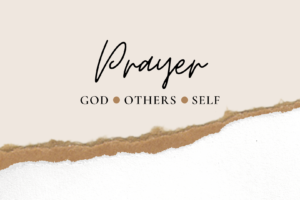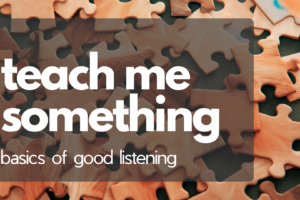Life would be so much easier if others could read our minds. Maybe a little awkward sometimes, but easier nonetheless. We wouldn’t have to put in the effort to actually say the hard things, and who are we kidding? No one likes saying the hard things.
But this is reality: people can’t read your mind. They don’t automatically know if you feel sad or if you are angry with them. They don’t know that you hate it when they leave dishes in the sink or trash on the ground. They don’t know you need them to spend time with you or check on you or that you need their help.
We fall so easily into the lie that “he or she should know how I feel or what I need or what I expect.” I am guilty, too. This mindset is harmful, and we need to be careful to make these assumptions. It is an unrealistic and unhealthy expectation to place on another because we aren’t God. We don’t know each other as intimately as He knows us, this Psalm 139 God. We don’t know each other’s thoughts and needs and feelings and desires.
Sure, over time in deep interpersonal relationships, we can learn the nonverbal cues that communicate what our loved one needs or feels. We can begin to notice when they feel down and when they need a break. But always? We can’t always be perfectly tuned in to another because we have other things that also need our attention. Expecting someone to “just know” us in and out is unfair. We must be willing to use our words and tell them.
We need to turn inward before we turn outward.
Are you aware of what you feel? Of what you think? Of what you need? Of what you expect? Of what holds you back from telling another these things? Take some time to reflect on these things in various close interpersonal relationships in your life. At first, as you get the hang of becoming aware, it may be helpful to write these things down.
Begin with the closest relationship in your life. Think about a recent situation where you felt hurt or disappointed by that person. Ask yourself, “how do I feel when I think about this situation now and how did I feel then?” Pick out your favorite Feelings Wheel, and name the feeling as accurately as you can. Then ask yourself, “what do I need from this person?” Write down those needs. Then ask, “What do I expect from this person?” Now pay careful attention to this list. Are these expectations too high or too low? If so, make the adjustments. It’s also important to consider why you are not communicating with clarity about your feelings and needs. What is holding you back from being honest?
Let’s start with a simple example: Last week your husband did not help you clean the kitchen. You felt frustrated and annoyed with him, not to mention tired from juggling so much. You held it in and huffed around the house for a few days, letting the dishes pile up in the sink, waiting for him to do them. Each day passed, and you got more frustrated and began lashing out about other things. He is confused about why you are so upset with him. You realize you are feeling frustrated and annoyed because he is not doing the dishes, and he should know to do them. You think about what you need- you need for him to do the dishes after dinner each night. You also realize you don’t want to tell him this because he forgets so often and it’s tiring to remind him.
Of course this is trivial, and you can probably think of heavier situations, but the idea is the same.
Now it’s time to be brave and have the hard conversation.
The person will never know how to help or what to fix or what is wrong if you aren’t willing to be vulnerable and share openly and clearly about it. Approach the person at a time when you both can give the conversation your undivided attention for a few minutes. Use an “I-statement” to communicate the problem, how you feel about it, what you need, and anything else that may be relevant. The basic “I-statement” formula is as follows:
I feel __________________(name the feeling) when you ______________ (name the problematic behavior) because ________________ (the reason why the behavior is problematic). What I need from you is ____________________ (name the expectation, desire, or need here).
An example of this in our previous example could look like this:
I feel frustrated and annoyed when you do not help me clean the kitchen because we are a team, and I can’t do this all by myself. I need you to help me without me always having to ask. I need you to do the dishes each night after dinner.
We want to be clear with our people. “Clarity is kindness,” author and podcaster Emily P. Freeman often says. When we are clear about these things with our close friends, family members, coworkers and the like, we are being loving. We live in disappointment when others don’t meet our expectations, but how will they ever know if we don’t tell them? We must stop expecting them to be able to read our minds. Let’s humble ourselves and be open about what we feel and what we need. And let’s see how that changes our relationships.






Recent Comments